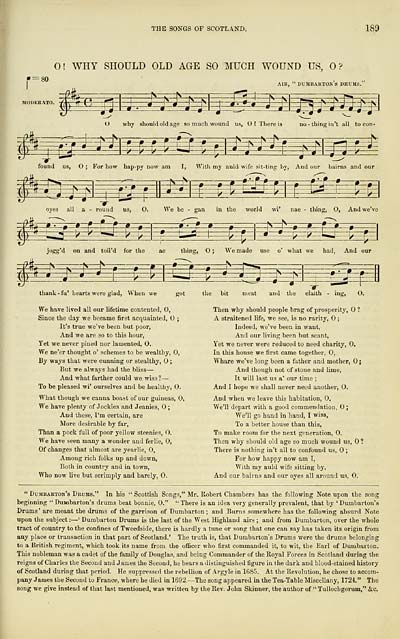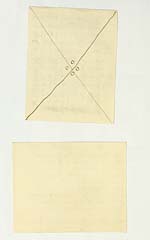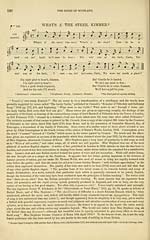Glen Collection of printed music > Printed music > Wood's edition of the songs of Scotland
(215) Page 189 - O! Why should old age so much wound us, o
Download files
Complete book:
Individual page:
Thumbnail gallery: Grid view | List view

THE SONGS OF SCOTLAND.
189
0! WHY SHOULD OLD AGE SO MUCH WOUND US, 0?
: 80
MOUERATO.
AIR, " DUMBARTON S DRUMS.
fa
P
*5
%^#Z^m$f-
O why should old age so much wound us, O ? There is no- thing in't all to con-
*=fc
^=P=f=F
!*=£+
=£
at*:
It
-v—v—v-
-V— t
iz^:
found us, O; For how hap-py now am I, With my auld wife sit-ting by, And our bairns and our
oyes all a - round us, O.
r m — « 1 — i — « —
We be - gan in the world wi' nae - thing, O, And we've
=*=*=F~y~-^--p=£
JE
jogg'd on and toil'd for the ae thing, O ; We made use o' what we had, And our
fc=i*
£
Ea^
=i=£=^
^E*E ZXZ0^
thank - fu' hearts were glad, When we
got
We have lived all our lifetime contented, 0,
Since the day we became first acquainted, ;
It's true we've been but poor,
And we are so to this hour,
Yet we never pined nor lamented, O.
We ne'er thought o' schemes to be wealthy, 0,
By ways that were cunning or stealthy, ;
But we always had the bliss — ■
And what farther could we wis3 ? —
To be pleased wi' ourselves and be healthy, 0.
What though we canna boast of our guineas, 0,
We have plenty of Jockies and Jeanies, ;
And these, I'm certain, are
More desirable by far,
Than a pock full of poor yellow steenies, 0.
We have seen many a wonder and ferlie, 0,
Of changes that almost are yearlie, 0,
Among rich folks up and down,
Both in country and in town,
Who now live but scrimply and barely, 0.
the bit meat and the claith - ing, O.
Then why should people brag of prosperity, ?
A straitened life, we see, is no rarity, ;
Indeed, we've been in want,
And our living been but scant,
Yet we never were reduced to need charity, 0.
In this house we first came together, 0,
Whare we've long been a father and mother, 0;
And though not of stone and lime,
It will last us a' our time ;
And I hope we shall never need another, 0.
And when we leave this habitation, 0,
We'll depart with a good commendation, ;
We'll go hand in hand, I wiss,
To a better house than this,
To make room for the next generation, 0.
Then why should old age so much wound ua, ?
There is nothing in't all to confound us, ;
For how happy now am I,
With my auld wife sitting by,
And our bairns and our oyes all around us, 0.
" Dumbarton's Drums." In his " Scottish Songs," Mr. Robert Chambers has the following Note upon the song
beginning " Dumbarton's drums beat bonnie, 0." " There is an idea very generally prevalent, that by ' Dumbarton's
Drums' are meant the drums of the garrison of Dumbarton ; and Burns somewhere has the following absurd Note
upon the subject : — ' Dumbarton Drums is the last of the West Highland airs ; and from Dumbarton, over the whole
tract of country to the confines of Tweedside, there is hardly a tune or song that one can say has taken its origin from
any place or transaction in that part of Scotland.' The truth is, that Dumbarton's Drums were the drums belonging
to a British regiment, which took its name from the officer who first commanded it, to wit, the Earl of Dumbarton.
This nobleman was a cadet of the family of Douglas, and being Commander of the Royal Forces in Scotland during the
reigns of Charles the Second and James the Second, he bears a distinguished figure in the dark and blood-stained history
of Scotland during that period. He suppressed the rebellion of Argyle in 1685. At the Revolution, he chose to accom-
pany James the Second to France, where he died in 1692.- — The song appeared in the Tea-Table Miscellany, 1724." The
song we give instead of that last mentioned, was written by the Rev. John Skinner, the author of " Tullochgorum," &c.
189
0! WHY SHOULD OLD AGE SO MUCH WOUND US, 0?
: 80
MOUERATO.
AIR, " DUMBARTON S DRUMS.
fa
P
*5
%^#Z^m$f-
O why should old age so much wound us, O ? There is no- thing in't all to con-
*=fc
^=P=f=F
!*=£+
=£
at*:
It
-v—v—v-
-V— t
iz^:
found us, O; For how hap-py now am I, With my auld wife sit-ting by, And our bairns and our
oyes all a - round us, O.
r m — « 1 — i — « —
We be - gan in the world wi' nae - thing, O, And we've
=*=*=F~y~-^--p=£
JE
jogg'd on and toil'd for the ae thing, O ; We made use o' what we had, And our
fc=i*
£
Ea^
=i=£=^
^E*E ZXZ0^
thank - fu' hearts were glad, When we
got
We have lived all our lifetime contented, 0,
Since the day we became first acquainted, ;
It's true we've been but poor,
And we are so to this hour,
Yet we never pined nor lamented, O.
We ne'er thought o' schemes to be wealthy, 0,
By ways that were cunning or stealthy, ;
But we always had the bliss — ■
And what farther could we wis3 ? —
To be pleased wi' ourselves and be healthy, 0.
What though we canna boast of our guineas, 0,
We have plenty of Jockies and Jeanies, ;
And these, I'm certain, are
More desirable by far,
Than a pock full of poor yellow steenies, 0.
We have seen many a wonder and ferlie, 0,
Of changes that almost are yearlie, 0,
Among rich folks up and down,
Both in country and in town,
Who now live but scrimply and barely, 0.
the bit meat and the claith - ing, O.
Then why should people brag of prosperity, ?
A straitened life, we see, is no rarity, ;
Indeed, we've been in want,
And our living been but scant,
Yet we never were reduced to need charity, 0.
In this house we first came together, 0,
Whare we've long been a father and mother, 0;
And though not of stone and lime,
It will last us a' our time ;
And I hope we shall never need another, 0.
And when we leave this habitation, 0,
We'll depart with a good commendation, ;
We'll go hand in hand, I wiss,
To a better house than this,
To make room for the next generation, 0.
Then why should old age so much wound ua, ?
There is nothing in't all to confound us, ;
For how happy now am I,
With my auld wife sitting by,
And our bairns and our oyes all around us, 0.
" Dumbarton's Drums." In his " Scottish Songs," Mr. Robert Chambers has the following Note upon the song
beginning " Dumbarton's drums beat bonnie, 0." " There is an idea very generally prevalent, that by ' Dumbarton's
Drums' are meant the drums of the garrison of Dumbarton ; and Burns somewhere has the following absurd Note
upon the subject : — ' Dumbarton Drums is the last of the West Highland airs ; and from Dumbarton, over the whole
tract of country to the confines of Tweedside, there is hardly a tune or song that one can say has taken its origin from
any place or transaction in that part of Scotland.' The truth is, that Dumbarton's Drums were the drums belonging
to a British regiment, which took its name from the officer who first commanded it, to wit, the Earl of Dumbarton.
This nobleman was a cadet of the family of Douglas, and being Commander of the Royal Forces in Scotland during the
reigns of Charles the Second and James the Second, he bears a distinguished figure in the dark and blood-stained history
of Scotland during that period. He suppressed the rebellion of Argyle in 1685. At the Revolution, he chose to accom-
pany James the Second to France, where he died in 1692.- — The song appeared in the Tea-Table Miscellany, 1724." The
song we give instead of that last mentioned, was written by the Rev. John Skinner, the author of " Tullochgorum," &c.
Set display mode to: Large image | Transcription
Images and transcriptions on this page, including medium image downloads, may be used under the Creative Commons Attribution 4.0 International Licence unless otherwise stated. ![]()
| Special collections of printed music > Glen Collection of printed music > Printed music > Wood's edition of the songs of Scotland > (215) Page 189 - O! Why should old age so much wound us, o |
|---|
| Permanent URL | https://digital.nls.uk/91340323 |
|---|
| Description | Scottish songs and music of the 18th and early 19th centuries, including music for the Highland bagpipe. These are selected items from the collection of John Glen (1833 to 1904). Also includes a few manuscripts, some treatises, and other books on the subject. |
|---|
| Description | The Glen Collection and the Inglis Collection represent mainly 18th and 19th century Scottish music, including Scottish songs. The collections of Berlioz and Verdi collected by bibliographer Cecil Hopkinson contain contemporary and later editions of the works of the two composers Berlioz and Verdi. |
|---|

